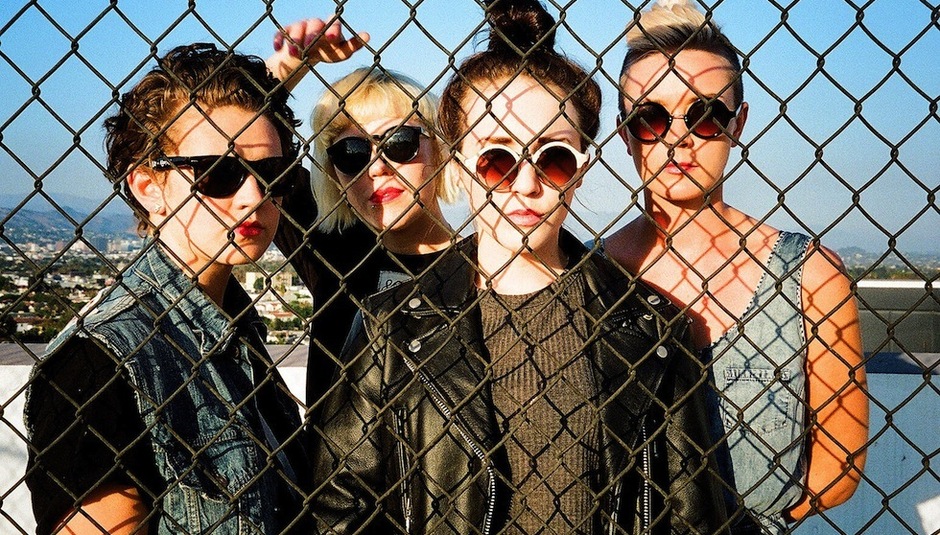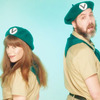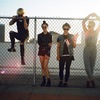Girl power? What it’s like being a woman in a band these days and being hit on by guys? These are things Drowned in Sound didn’t particularly feel like discussing with Pins. Largely because we’ve never discussed them with any of the other bands we’ve ever interviewed, but also because their second album, Wild Nights, out this week, is something of a cracker, they’re a blistering live band and – this being a music site and all – we’d much rather talk about those things.
In between tours – DiS caught them at the Sebright Arms in London recently and at the time of the interview they’d just finished a support slot with Sleater Kinney, and they’re now in the middle of a tour opening for both Drenge and Wire this spring – lead guitarist Lois MacDonald and singer/guitarist Faith Holgate took the time to sit down for a drink with us up in Manchester’s northern quarter to talk about the new record, big-name support slots, which one’s Liam and which one’s Noel, and how you’re actually supposed to pronounce “Sleater Kinney"...
Drowned in Sound: So Wild Nights is the second album you've done; how did writing, recording and suchlike differ from the first time around?
Lois MacDonald: We had more time putting it together and we'd already played a lot of the songs off it live. We probably spent a bit more time building the songs, so they may be a little bit more complex than on the first album.
Faith Holgate: And we worked with a producer this time, which we didn't last time. That was Dave Catching, at Rancho De La Luna [in Joshua Tree, California].
PINS take us on a trip to Joshua Tree where their new album Wild Nights was recorded.
Posted by Drowned in Sound on Tuesday, 9 June 2015
DiS: What made you choose to work with a producer this time?
LM: We definitely wanted to do it somewhere else, not in England. And because why not?
DiS: It sounds like a more confident album. Did you feel like you had a better idea of what you were doing the second time around?
LM: It was a really different experience to recording the first one. Maybe because we'd already recorded an album we were more comfortable with that situation anyway. But it was still quite a short amount of time to have. But as soon as we arrived it was like "the doors are open, the red wine's open... everyone was chatting and it was so pleasant.
DiS: How would you describe the change in sound? To me it sounds more riff-based, a bit meatier. Is that fair?
LM: I think with [Girls Like Us, their first album] there's this real immediacy, like it sounds as though we wrote the songs then recorded them five minutes later. I think you can hear that with this one we really put more effort into the songs or us adding interesting parts to them.
FH: We put more textured guitars on as well. And then Dave would suggest, like, using a different amp or using a different pedal. On the first one I used the same set-up for the entire record but this time I was using all sorts.
LM: We did demos of the whole album before we went, so all the main ideas were down. So every time we came to record a song it was a case of referencing the demo, going and setting up, recording - we still recorded live - but then we did that in the first few days, which left plenty of time for vocals and plenty of time for experimentation as well. Which is probably why there's a bit more of that on there.
DiS: It's interesting you mentioned the vocals; they seem to be more complex this time around, with more backing vocals and harmonies.
FH: I think everyone's got a little braver. They're all stepping up to the microphone now and everyone wants to sing, so that's how that came about. Honestly, that's how that came about!
LM: We've all tried to do bits like the 60s girl gang, do backing vocals like those 60s girl groups so there was a bit of that on the first one. But then it was all of us together saying the same thing, whereas I think we've branched out a bit on the second one and done more harmonies.
FH: Now everyone wants their time to shine I think [laughs].
DiS: You've had quite a lot of high-profile support slots. You've had The Fall and Sleater Kinney... or Slater Kinney as it's apparently pronounced... [the girls laugh] Yeah I didn't know that...
LM: Yeah I didn't know that either. Someone said "Slater" Kinney and it sounded weird.
FH: I kept hearing - what's he called on the radio on 6Music? Steve...
LM: Steve Lamacq.
FH: Yeah he kept saying "Slater" Kinney. I was like, what???
DiS: Didn't they mention the pronunciation in an interview or something?
LM: Maybe it's a British thing, that we think it's pronounced "Sleeter Kinney"?
DiS: I'm sticking with "Sleeter".
LM: They'll always be "Sleeter Kinney" to us.
DiS: Um, where was I? Right, so with The Fall, Sleater Kinney and the upcoming shows with Drenge and Wire, these are obviously more high-profile gigs than you're used to...
LM: When you get offered it, it's like in your wildest dreams you wouldn't expect it. I mean, we played with Warpaint and at the time that was, like, "oh my god."
FH: We played Brixton Academy with them, which holds however many thousand people and it was full at the time as well.
LM: But then when we played the Roundhouse with Sleater [she pronounces this Slater] Kinney, again we were thinking "Oh there's a lot of people here!
DiS: Is there much of a difference between playing those shows and the ones you do by yourselves?
FH: Well, when we were in Berlin we played the first show with Sleater [Slater] Kinney, then we stayed in Berlin an extra day and played our own show at 8mm bar, where the stage is the size of this table.
LM: The entire venue is about the size of this outdoor area [on account of the bar being rammed, we're doing the interview out in the smoking area]. So there's a real contrast, going from thousands of people to however many could squeeze into that little sweaty club.
DiS: Does that kind of change mean you need to make much of a change to the way you set up?
FH: You just have to reduce it.
LM: We usually get less time if we're supporting someone. Which songs not to play is the hardest bit really. It's always different if you're headlining or you're supporting, because you're playing for someone else's crowd. But we tend to play our favourites whoever we're playing with, because you want people to know you as the band that you are, not playing for whoever you're supporting.
DiS: On the last tour you played the new album in full as well as a Misfits cover and then 'Waiting for the End' and 'Girls Like Us'. It seemed like a risky move, opening the set with entirely new stuff; were you nervous about doing that?
FH: At the time it seemed like a good idea, but then in retrospect we were thinking "oh shit we're playing all these songs that nobody knows."
LM: That was the idea though. We played three shows, in Brighton, London and Manchester, and they were all smaller venues. We wanted to play our new album, basically, for people who were interested.
FH: I thought that if I liked a band then I'd like it if they did that. But then perhaps not everyone thinks that way.
DiS: I remember hearing a story about Neil Young doing that once. Apparently someone in the crowd yelled "play something we know", so he finished playing the new album and said "Now here's something you'll know" and proceeded to play the entire new album again.
FH: And that's Neil Young so what do we think we're doing?!
DiS: You covered the Misfits' 'Hybrid Moments' as the b-side to 'Too Little, Too Late'. What made you choose that one?
FH: It's just one of my favourite Misfits songs. I wanted to do it ages ago but no one was biting when I suggested it. I don't know why but then one day everyone just said yes, so I was like, "OK!"
LM: When we were in LA after recording the album we ended up doing a live session that was four songs and one of them was that Misfits one. We were really happy with how it came out and we thought it'd make a really good b-side.
DiS: Were there any other covers you considered?
FH: No we had two songs that we recorded but didn't put on the album. They were probably going to be the b-side, but then once we'd recorded the Misfits we were like "no actually let's go with that."
DiS: Are the others going to see the light of day at any point?
FH: We don't know, maybe.
LM: [Puts on her mysterious voice] maaaaybee. [Back to normal, affable northern accent] We have a few ideas for them but so many things happen so fast that we don't know whether it will ever happen.
FH: And then, you know when you're like, we've already done that so we want to do something else and you get left behind. Who knows?
LM: We do quite a bit of that anyway. Write something, ditch it, record it, ditch it.
DiS: Like Prince with his vault of 2,000 songs or whatever it is?
FH: That's what my laptop's like!
DiS: Who came up with the concept for the ‘Too Little Too Late’ video?
FH: We did. When we were drunk. We always think of video ideas when we've had a drink.
LM: Whenever we write a song I can see the video. Every single song has got a video concept. But this one was just loads of people swearing in slow motion and then it developed into more and more people.
It was a lot of fun. There was a layer of multi-coloured dust over everything in the studio.
DiS: How are things going with your record label, Haus of Pins? The last thing I saw on there was the Hymns Christmas album.
LM: Yeah we did a reissue of that because we sold out completely the first year, so we thought we'd do that again. We've got another one coming out that has got three bands on it, one song from each and that'll be out in May? We think? We're just pulling that all together.
FH: It's Dream Life, from Brighton, Jupiter-C from London and Kyogen, from Manchester, which is Kyoko's project. It's female-heavy this one.
DiS: Both of your albums are out, or will be out, on Bella Union. Was it not really feasible to release them through your own label?
FH: The first song we ever had was 'Shoot You' and the b-side was 'Eleventh Hour' and that was on Haus of Pins. Before we were signed. But then we thought "Ugh, god, let's get with a real label!"
LM: There's obviously benefits to being with an actual label that have got money. They're a really good label, Bella Union. Not being a massive label where you can't speak to anyone and you get told what to do, they're actually really supportive. You can just talk to Simon [Raymonde, Bella Union founder and former Cocteau Twin] or Facebook him "hello", get advice on this and that.
FH: It's great, isn't it? We just did that single ourselves and then Simon came to see us. We played a show at The Bunker with Savages and he said he'll put out an EP for us. Well, he said "I'll sign you if you want" and we were like "all right." So he signed us for our next EP as a see-how-it-goes kind of thing.
LM: That was our LuvU4Lyf EP and it was really fun to do, went pretty smoothly...
FH: So then we signed with them. But we didn't want to stop doing Haus of Pins, so that's why we started doing it with other bands.
DiS: Reading back through David Edwards' review for Drowned in Sound of the Girls Like Us, he pointed out that the comparisons when you first broke through were the likes of Siouxie and the Banshees, Crystal Stilts and Elastica, which seemed a bit predictable...
FH: They're three really different bands though...
DiS: True. But the things I've been reading lately have compared you instead to the likes of The Jesus and Mary Chain, My Bloody Valentine and Led Zeppelin...
LM: Led Zeppelin!?
FH: Wow!
DiS: I think that might have been mine... [It was, in a review for Under the Radar magazine in the US]
FH: We always get Jesus and Mary Chain.
DiS: Do you think that's something of a fairer assessment?
LM: I think people are going to make references all the time. For us, we try and treat each song as its own little thing. So I think some songs sound like one band, if you want to hear it. But we don't try and be one thing.
FH: I'm just glad that all of the bands we get compared to are good. Because imagine if you got compared to a band and you thought they were really rubbish!
DiS: Well your PR did call you two Liam and Noel when I spoke to him the other day...
LM: Oh did he now!?
DiS: I told him he was being harsh.
LM: Well we'll ask him about this!
FH: Which one's which though?
DiS: I don't want to insult either of you...
LM: No one wants to be Noel...
DiS: Well you're the guitarist and you're the singer, so...
FH: I like Oasis, so it's all right.
LM: Well yeah I like Oasis, but do you want to be the Gallagher brothers?
FH: No, I don't. I'd love it if someone compared to Oasis though.
LM: That would be lazy. "They're from Manchester, so..
DiS: Lazy coverage of Manc music – typical London-centric media.
LM: "Think Oasis, think The Smiths! It's Pins!"
DiS: What kind of things were you listening to when you were writing the album? Was it those kinds of bands?
FH: I'm always listening to the Mary Chain. Not really Siouxie and the Banshees; I only really started listening to them once I heard people comparing us to them. I hadn't really listened before.
LM: The ones we were all definitely listening to were things like the Velvet Underground and Crystal Stilts.
FH: But that's like our constant playlist in the van or on our own iPhones and stuff. But I can't quite remember what our main references were. I just remember one song, 'Got it Bad', I wanted to be like the Velvet Underground and Dave was like "we get a lot of that!"
Wild Nights is out 15th June on Bella Union
CD: http://smarturl.it/WildNightsCD
LP: http://smarturl.it/WildNightsLP
iTunes: http://smarturl.it/WildNightsDL






















